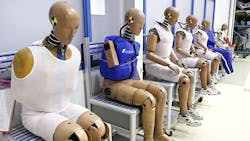TOKYO - Japanese auto parts maker Takata on Thursday warned over a bigger-than-expected annual loss, but it had little to say about a deadly airbag defect that has plunged the firm into crisis, as it faces lawsuits and regulatory probes.
Shares in Takata, one of the world's biggest airbag makers, have lost about half their value since the beginning of the year, with questions mounting over defects linked to at least four deaths in the U.S. and dozens of injuries.
Millions of vehicles produced by some of the largest automakers, including Toyota (IW 1000/8) and General Motors (IW 500/5) (GM), are being recalled because of the risk that an airbag could improperly inflate and rupture, potentially firing deadly shrapnel at the occupants.
On Thursday, the Tokyo-based company's executive vice President Yoichiro Nomura bowed to dozens of reporters at an earnings conference -- a standard act of contrition among Japanese executives.
But he declined to discuss details of the crisis, keeping up the company's largely silent response to the issue.
A visibly-nervous Nomura acknowledged however that at least two people died in vehicles equipped with airbags made by Takata -- as the firm warned it would report a 25 billion yen (US $218 million) fiscal year loss, reversing a year-earlier profit.
"We are aware of media reports that say four. But as far as we know right now, it's two people," he said.
He added that the firm "sincerely apologizes" for the defect, but when asked about its seemingly flat-footed public relations response, Nomura said: "We want to make announcements appropriately."
Chairman Shigehisa Takada, who was not at the press briefing, said in an earlier statement that the company was probing the cause of the defect.
'Not Very Sophisticated'
Little-known outside Japan, Takata was founded in 1933 as a textile company that evolved into an automotive parts giant which started selling airbags in the eighties.
It has dozens of plants and offices in 20 countries, including the United States, China and Mexico.
The airbag division accounts for about 40% of its total revenue, which was 556.99 billion yen last fiscal year.
"Takata is not being especially forthcoming on this...but (it's) not a very sophisticated company when it comes to public relations," said Hans Greimel, Asia editor for the Automotive News.
"I am not sure if they are fully aware of how to deal with a crisis like this."
Last month, a lawsuit on behalf of affected vehicle owners was filed in Florida alleging that Takata tried to cover up the defect.
The lawsuit, which follows separate claims filed by individuals, also reportedly lists car manufacturers, including Toyota and Honda, as defendants.
The Wall Street Journal has reported that federal prosecutors in New York were probing whether Takata made misleading statements about the safety of its bags to U.S. regulators.
The National Highway Traffic Safety Administration also expanded its "urgent" warning to owners of cars with affected airbags to take them to dealers to fix the problem.
Earlier reports have suggested that the defect may be linked to a chemical propellant used to inflate the air-bags which can more easily rupture in areas with high humidity.
Police reportedly investigated at least one driver death as a murder due to woman's grisly injuries, until their focus switched to the vehicle's airbag.
Major automakers have shied away from discussing their future relationship with Takata, but analysts said a quick switch was difficult given the Japanese giant's foothold in the sector.
Toyota's executive vice president Nobuyori Kodaira said Wednesday at an earnings conference that the world's biggest automaker was looking to replace the defective part "with something of better quality."
But "I will not comment on what Toyota would do in terms of its relationship with Takata," he added.
Hiroshi Hiyama, AFP
Copyright Agence France-Presse, 2014
About the Author
Agence France-Presse
Copyright Agence France-Presse, 2002-2025. AFP text, photos, graphics and logos shall not be reproduced, published, broadcast, rewritten for broadcast or publication or redistributed directly or indirectly in any medium. AFP shall not be held liable for any delays, inaccuracies, errors or omissions in any AFP content, or for any actions taken in consequence.
